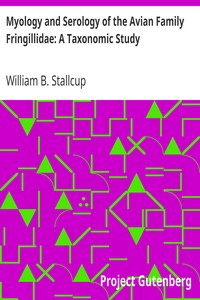Myology and Serology of the Avian Family Fringillidae: A Taxonomic Study
"Myology and Serology of the Avian Family Fringillidae: A Taxonomic Study" by William B. Stallcup is a scientific publication written in the mid-20th century. The work focuses on the myological and serological characteristics of birds within the Fringillidae family, aiming to clarify taxonomic relationships that have historically been obscured by reliance on external morphological features. Through detailed anatomical studies and innovative serological techniques, it seeks to provide a deeper understanding of the
evolutionary links between various species of finches. The opening of this study introduces the challenges faced in understanding the taxonomy of passerine birds, particularly those in the Fringillidae family, which includes several groups that appear distinct externally but may have shared anatomical traits. Stallcup discusses past research that has emphasized external characteristics, such as bill shape, while advocating for a more nuanced approach that includes internal structures like muscle patterns and biochemical properties. He outlines the methods he will employ to explore the comparative myology of the pelvic appendage and the physiology of birds, setting the stage for a detailed analysis aimed at re-evaluating and possibly restructuring the classification of finch species. (This is an automatically generated summary.)
Read now or download (free!)
| Choose how to read this book | Url | Size | ||||
|---|---|---|---|---|---|---|
| Read online (web) | https://www.gutenberg.org/ebooks/33914.html.images | 216 kB | ||||
| EPUB3 (E-readers incl. Send-to-Kindle) | https://www.gutenberg.org/ebooks/33914.epub3.images | 392 kB | ||||
| EPUB (older E-readers) | https://www.gutenberg.org/ebooks/33914.epub.images | 394 kB | ||||
| EPUB (no images, older E-readers) | https://www.gutenberg.org/ebooks/33914.epub.noimages | 112 kB | ||||
| Kindle | https://www.gutenberg.org/ebooks/33914.kf8.images | 1.0 MB | ||||
| older Kindles | https://www.gutenberg.org/ebooks/33914.kindle.images | 1019 kB | ||||
| Plain Text UTF-8 | https://www.gutenberg.org/ebooks/33914.txt.utf-8 | 163 kB | ||||
| Download HTML (zip) | https://www.gutenberg.org/cache/epub/33914/pg33914-h.zip | 460 kB | ||||
| There may be more files related to this item. | ||||||
Similar Books
About this eBook
| Author | Stallcup, William B. |
|---|---|
| Title | Myology and Serology of the Avian Family Fringillidae: A Taxonomic Study |
| Note | Reading ease score: 48.3 (College-level). Difficult to read. |
| Credits |
Produced by Chris Curnow, Tom Cosmas, Joseph Cooper and the Online Distributed Proofreading Team at http://www.pgdp.net |
| Language | English |
| LoC Class | QH: Science: Natural history |
| Subject | Birds |
| Subject | Finches |
| Category | Text |
| EBook-No. | 33914 |
| Release Date | Oct 19, 2010 |
| Copyright Status | Public domain in the USA. |
| Downloads | 176 downloads in the last 30 days. |
| Project Gutenberg eBooks are always free! | |

